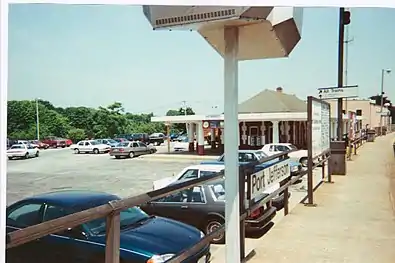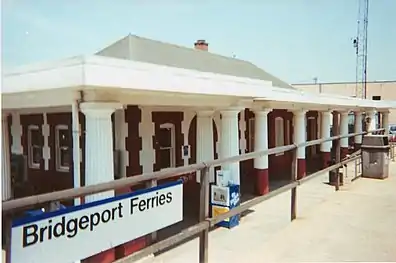Port Jefferson | |||||||||||||
|---|---|---|---|---|---|---|---|---|---|---|---|---|---|
 Port Jefferson station in 2021 | |||||||||||||
| General information | |||||||||||||
| Location | Main Street & Oakland Avenue Port Jefferson Station, New York | ||||||||||||
| Coordinates | 40°56′4.99″N 73°3′13.29″W / 40.9347194°N 73.0536917°W | ||||||||||||
| Owned by | Long Island Rail Road | ||||||||||||
| Platforms | 1 side platform | ||||||||||||
| Tracks | 4 | ||||||||||||
| Connections | |||||||||||||
| Construction | |||||||||||||
| Parking | Yes | ||||||||||||
| Bicycle facilities | Yes | ||||||||||||
| Accessible | Yes | ||||||||||||
| Other information | |||||||||||||
| Fare zone | 10 | ||||||||||||
| History | |||||||||||||
| Opened | January 13, 1873[3] | ||||||||||||
| Rebuilt | 1875, 1903, 1968, 2001, 2019 | ||||||||||||
| Passengers | |||||||||||||
| 2006 | 1,793[4] | ||||||||||||
| Services | |||||||||||||
| |||||||||||||
| |||||||||||||
Port Jefferson is the terminus for the Port Jefferson Branch of the Long Island Rail Road in Port Jefferson Station, New York. The station is located on New York State Route 25A (Main Street), on the north side of the tracks, but is also accessible from Oakland Avenue, as well as Railroad Avenue and Union Street on the south side of the tracks. All service is diesel-only, and most off-peak trains are shuttles requiring a transfer to an electric train at Huntington.
The station also serves Suffolk County Transit buses and occasionally the Village of Port Jefferson's own local jitney buses. One Suffolk County Transit bus, (Route S51) leads to the Bridgeport & Port Jefferson Ferry, approximately one mile to the north. It features service to Bridgeport, Connecticut, hence the reason for some station name signs being adjacent to "Bridgeport Ferries" signs.
History
Port Jefferson station was originally opened on January 13, 1873 by the Smithtown and Port Jefferson Railroad,[3] but was burned on February 1, 1874. The second station was completed in June 1875. In 1895, the Port Jefferson Branch was extended to Wading River. The second Port Jefferson station was closed in 1903, and was used as a yard building, while the third station was built across Main Street. Designed by Stanford White and funded by the residents of the nearby Village of Belle Terre, it opened on July 29, 1903.[5] Port Jefferson Station resumed its status as the terminus of the line on October 9, 1938, when the line was abandoned between Port Jefferson and Wading River. The "yard building" was abandoned in April 1963. The station was remodeled in 1968, but restored in 2001 based on its previous 1903 design. Port Jefferson is 59.4 miles (95.6 km) from Penn Station and travel time varies between 1 hour, 40 minutes and 2 hours, depending on if one has to transfer to an electric train to reach the city.
In 2019, the LIRR completed an extensive renovation of the station building, restoring it to its prototypical appearance at the turn of the twentieth century. New signage and brick-paver walkways were also installed.[6]
Station layout
This station has one 10-car-long high-level side platform north of the tracks. To the east of the station is the Port Jefferson Yard, which provides additional storage tracks.
| M | Mezzanine | Crossover between platform and Railroad Avenue |
| P Platform level |
Side platform | |
| Track 1 | ← Port Jefferson Branch toward Huntington, Grand Central Madison, Long Island City, or Penn Station (Stony Brook) | |
| Track 2 | ← Storage track → | |
| Track 3 | ← Storage track → | |
| Track 4 | ← Storage track → | |
| Ground level | Exit/entrance to Oakland Avenue and parking | |
Gallery
- Port Jefferson LIRR station
 Parking lot and station building, as seen in 1999.
Parking lot and station building, as seen in 1999. 2007 image of station after the 2001 restoration project.
2007 image of station after the 2001 restoration project. One of the signs at the station to complement the station name sign, showing the connection to the ferry to Bridgeport.
One of the signs at the station to complement the station name sign, showing the connection to the ferry to Bridgeport.
References
- ↑ "Routes and Schedules". Suffolk County Transit. October 29, 2023. Retrieved November 12, 2023.
- ↑ Port Jeff Jitney - Incorporated Village of Port Jefferson
- 1 2 "Port Jefferson". The Brooklyn Daily Eagle. January 13, 1873. p. 4. Retrieved April 2, 2021 – via Newspapers.com.

- ↑ Average weekday, 2006 LIRR Origin and Destination Study
- ↑ Morrison, David D.; Pakaluk, Valerie (2003). Long Island Rail Road Stations. Charleston, SC: Arcadia Publishing. p. 81. ISBN 0-7385-1180-3. Retrieved November 24, 2011.
- ↑ "Port Jefferson Station Enhancement (Completed 03/2019)". A Modern LI. Retrieved August 15, 2020.